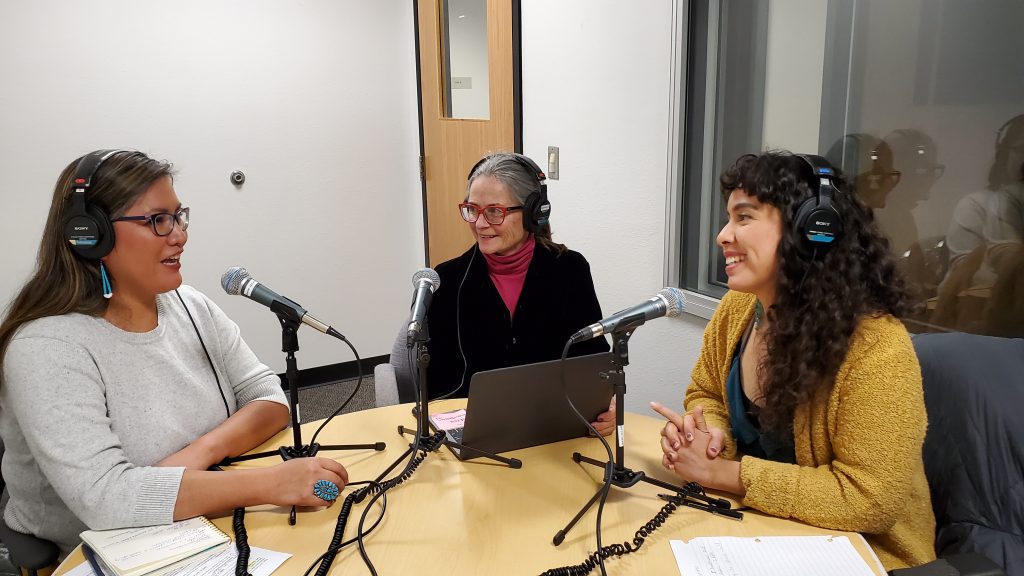Fairness First podcast explores institutional injustice and how organizations discuss and act upon health inequity

How comfortable do you think senior management at your organization feels in talking about discrimination, race and racism?
This is one of the questions included in the Regional Health Equity Survey (RHES) that sparked a discussion on the most recent episode of Fairness First, the podcast produced by NAU’s Southwest Health Equity Research Collaborative (SHERC).
Podcast hosts Alexandra Samarron and Dulce Jiménez, researchers with the Center for Health Equity Research, interviewed Lisa Blyth, Yavapai County regional director for First Things First early childhood agency in Arizona.
In their third episode, “Shared Vision for Health Equity,” the hosts and their guest explored survey questions from the RHES that gauged how individuals in positions of leadership across sectors like education, transportation, and public health departments are addressing the root causes of health inequity or injustice in their communities with their employees and community members.
In the RHES, researchers from SHERC’s Community Engagement Core (CEC) asked more than 200 community, organizational, and grassroots leaders of five northern Arizona counties — Apache, Coconino, Mohave, Navajo, and Yavapai — a series of 48 questions. According to Jiménez, the goal of the RHES is to understand how organizations across different sectors work on local health equity issues and strengthen their capacity to work together. The RHES addressed the social, environmental and economic conditions that impact the health and well-being of communities in northern Arizona as seen by leaders in nonprofit business, private industry, government, and community groups and organizations.
Blyth said that, since taking the RHES, and given recent social unrest in the country due to racial inequity, she has re-evaluated and explored her thoughts on social justice, racial inequity, and the action needed to engage in personal and organizational level transformation to advance health equity.
In the interview, Blyth said that her organization is “pretty culturally diverse.” Yet she said before taking the survey, she had not intentionally reflected on how her organization explicitly addressed structural inequity. Blyth mentioned she learned the significance of an organization moving away from being non-racist to becoming anti-racist as a result of recent events and social unrest due to racial inequity in the US.
During the podcast, Samarron refers to Ibram X. Kendi, founding director of the Center for Anti-racist Research at Boston University and author of “How to Be an Anti-Racist.”
“The opposite of racist is not non-racist. It is anti-racist,” Samarron said, quoting the book. “What’s the difference? One endorses either the idea of hierarchy as a racist or racial equality as an anti-racist. One either believes problems are rooted in groups of people as a racist or locates the roots of problems in power and policies as an anti-racist. … There is no in-between safe space of not racist. The claim of not racist neutrality is a mask for racism.”
Blyth tells a story of how through her work, she is aware of public transportation issues in Arizona and that while she was in a meeting, she learned there was CARES (Coronavirus Aid, Relief, and Economic Security) Act funding, $2.2 trillion economic stimulus bill, that could be used to transport food to people.
She was in another meeting and learned that schools were trying to organize their lunch programs during the pandemic and were trying to reach children in rural regions who may not be enrolled in school, but were running out of food resources. She brought two sectors together to solve the problem through the CARES Act funding.
“That is essentially what the Regional Health Equity Survey is all about ––that multi-sectoral approach,” Jiménez said.
Fairness First will continue their discussion on the RHES in the second part of episode 3. Fairness First is available through iTunes, Spotify, Podbean, and other podcasts sources.
SHERC is a grant-funded initiative of the Center for Health Equity Research and is supported by funding from the National Institute on Minority Health and Health Disparities of the National Institutes of Health (U54MD012388).